Canada’s newly appointed Prime Minister, Mark Carney, has called for an early election in response to escalating tensions with U.S. President Donald Trump. The Liberal leader announced that the country will head to the polls on April 28, with a condensed five-week campaign period.
Carney’s decision comes amid an ongoing trade dispute and remarks from Trump suggesting that Canada should become the 51st state of the United States. The American president’s aggressive stance has significantly influenced Canada’s political landscape, sparking a wave of nationalism and strengthening support for the Liberals.
“President Trump claims that Canada isn’t a real country. He wants to break us so America can own us. We will not let that happen,” Carney declared, emphasizing the stakes of the upcoming election.

The Liberals had been facing an uphill battle leading into this year’s election, especially after Justin Trudeau stepped down as party leader in January. However, Trump’s trade measures and controversial statements have altered the political climate. Carney, who officially took over as Liberal leader on March 9, argues that the nation needs a government with a firm mandate during these turbulent times.
“The next election will be one of the most consequential in our lifetimes,” he wrote on social media.
The election will determine who controls the 343 seats in the House of Commons. While multiple parties are contesting, the race is expected to be a direct showdown between the governing Liberals and the opposition Conservatives. The party that secures a parliamentary majority—either independently or through a coalition—will form the next government, with its leader becoming the prime minister.
Carney, a seasoned economist, previously led the Bank of Canada during the 2008 financial crisis before serving as the governor of the Bank of England, where he played a pivotal role in managing Brexit-related economic challenges.
On the other side of the political spectrum, Conservative leader Pierre Poilievre is mounting a strong challenge. His party had been projected to win comfortably before Trump’s trade war and sovereignty rhetoric reshaped the campaign’s focus. While Poilievre has vowed to push back against Trump’s aggressive policies, Alberta Premier Danielle Smith suggested he could align well with the “new direction in America.”
“I will insist the president recognizes the independence and sovereignty of Canada. I will insist he stops tariffing our nation,” Poilievre stated as he launched his campaign.

Poilievre, a political veteran known for his combative style, acknowledged the frustration and anxiety many Canadians feel regarding Trump’s actions.
“I know a lot of people are worried, angry and anxious. And with good reason as a result of the president’s unacceptable threats against our country,” he said. “You are worried about your job and the sovereignty of our nation. And you are angry at the feeling of betrayal that these unacceptable words and tariffs have made us all experience. I share your anger and I share the worry about our future.”
Trump has already imposed a 25% tariff on Canadian steel and aluminum and is threatening to expand those tariffs to all Canadian imports, with the new measures set to take effect on April 2. The ongoing trade war has created economic uncertainty and heightened tensions between the two nations.
Notably, Carney has yet to have a direct conversation with Trump, and such a discussion may not occur before the election. While Trump previously referred to Trudeau as a “governor,” he has so far refrained from mentioning Carney by name.
As the election campaign unfolds, Canadians are now faced with a critical decision: which leader is best equipped to defend the country’s sovereignty and economic stability in the face of unprecedented challenges from its southern neighbor.





